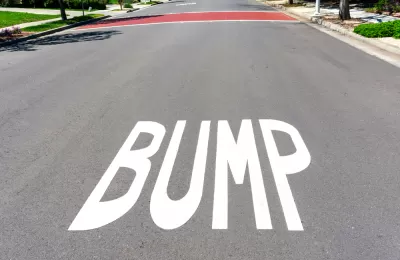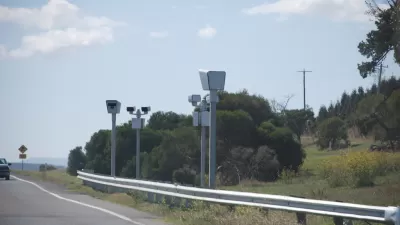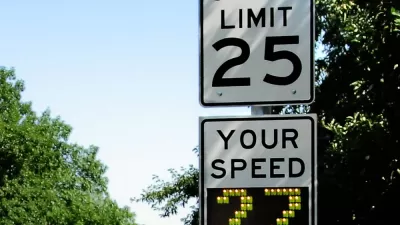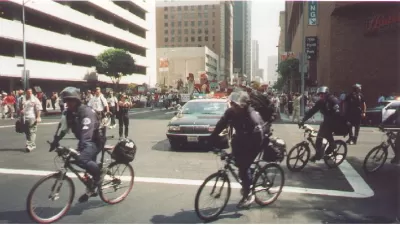If Texas lawmakers hate it, California lawmakers must love it, right? Not so fast.

Steve Lopez reports on the stalled efforts to increase the amount of automated traffic enforcement in California, with two state bills focusing on automated speed enforcement in school zones and in areas with high rates of collisions.
Lopez frames the political movement as a response to the worsening safety conditions on the road during the pandemic. "Nationally, there was an 8% increase in auto fatalities, with a death toll of 42,060 — and that was in a pandemic year with significant reductions in traffic," explains Lopez of the well documented trend of pandemic life, reported by Planetizen in July 2020, October 2020, and January 2021, for example.
California legislators introduced two bills, one in the State Senate and one in the State Assembly, in an effort to deploy a proven safety technology, but both have hit speedbumps. "SB 735 by Sen. Susan Rubio (D-Baldwin Park), which calls for automated speed enforcement in school zones throughout California ran into a wall of opposition from police organizations and others, including the ACLU." That bill has been "undermined" by amendments, according to Lopez, and is stuck in limbo. The second bill, AB 550, by Assemblyman David Chiu (D-San Francisco), "calls for automated speed enforcement in areas with high rates of serious collisions." That bill has been "scaled back after similar opposition, but is moving forward at the moment, with a hearing scheduled Monday before the Assembly Transportation Committee."
The article includes more detail about the legislative moves that have altered the bills so far and adds human interest stories of some f the advocates pushing for automated enforcement.
The state of California's debate about automated traffic enforcement stands in stark contrast to that of Texas, where legislators are currently working to shut down remaining local automated traffic enforcement technologies, grandfathered-in before 2019 state legislation preempted local governments from using automated traffic enforcement technologies.
FULL STORY: In Sacramento, legislative attempts to slow down drivers have hit speed bumps

Montreal Mall to Become 6,000 Housing Units
Place Versailles will be transformed into a mixed-use complex over the next 25 years.

Planetizen Federal Action Tracker
A weekly monitor of how Trump’s orders and actions are impacting planners and planning in America.

DARTSpace Platform Streamlines Dallas TOD Application Process
The Dallas transit agency hopes a shorter permitting timeline will boost transit-oriented development around rail stations.

Bicycles and Books — In Sacramento, Libraries Now Offer Both
Adult library card holders can check out e-bikes and e-trikes for up to one week.

Colorado Landfills Emit as Much Pollution as 1M Cars
Landfills are the third-largest source of methane pollution in Colorado, after agriculture and fossil fuel extraction.

Tulsa Paid Remote Workers $10,000 to Move In — Nearly All of Them Stayed
The Tulsa Remote program generated more than $4 in local economic benefits for every dollar spent.
Urban Design for Planners 1: Software Tools
This six-course series explores essential urban design concepts using open source software and equips planners with the tools they need to participate fully in the urban design process.
Planning for Universal Design
Learn the tools for implementing Universal Design in planning regulations.
City of Mt Shasta
City of Camden Redevelopment Agency
City of Astoria
Transportation Research & Education Center (TREC) at Portland State University
City of Camden Redevelopment Agency
Municipality of Princeton (NJ)
Regional Transportation Commission of Southern Nevada





























